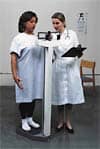The Patient-Centered Outcomes Research Institute (PCORI) Board of Governors approved a three-year $2.5 million demonstration project to the American Sleep Apnea Association (ASAA). The ASAA’s study is called Monitoring and Peer Support to Improve Treatment Adherence and Outcomes in Patients with Overlap Chronic Obstructive Pulmonary Disease and Sleep Apnea via a Large PCORnet Collaboration (simply known as the O2VERLAP Study). The award has been approved pending completion of a business and programmatic review by PCORI staff and issuance of a formal award contract.
The multi-partner demonstration project will compare the effectiveness of a proactive care (web-based peer coaching education and support intervention) versus reactive care on improving adherence to nocturnal oxygen and positive airway pressure (PAP) therapies in patients diagnosed with both chronic obstructive pulmonary disease (COPD) and obstructive sleep apnea (OSA). It will also compare the effectiveness of the two intervention groups on patient-centered outcomes including sleep quality and symptoms.
O2VERLAP results will provide answers for clinicians seeking the best ways to remove barriers to treatment adherence and strategies for providing efficient educational and coaching platforms. The results will also help patients understand the benefits of their treatment. Additionally, the findings will help provide guidance for using social media, peer-to-peer support, Apple ResearchKit iPhone apps, and viral messaging to help recruit and enroll new participants, with the ultimate goal of improving the patient infrastructure for The National Patient-Centered Clinical Research Network (PCORnet).
“Other PCORI-funded projects have shown that ‘peer’ support is successful in increasing PAP adherence and my own research has shown that a group self-management approach led by a sleep provider with sleep apnea facilitating group support sessions results in an increase in PAP adherence,” says Carl Stepnowsky, PhD, the co-principal investigator, associate professor at University of California at San Diego and ASAA’s chief science officer, in a release. “This line of research has resulted in an approach called the Sleep Apnea Self-Management Program, which will be the basis of the material and content for this intervention.”
The project will also include the engagement of patient partners and stakeholders in a series of focus groups and interviews to understand treatment barriers, important outcomes and to refine the development of a peer-led Internet based coaching program to improve adherence and other patient-centered outcomes in individuals with both COPD and OSA.
The project also reunites the ASAA with five patient-powered research networks (PPRNs) and one clinical data research network (CDRN) that are part of PCORnet, two professional medical associations and three patient-centered home medical companies. These groups include:
- The COPD PPRN
- The Health eHeart Alliance PPRN
- The American BRCA Outcomes and Utilization of Testing Patient- Powered Research Network (ABOUT) PPRN
- The Population Research in Identity and Disparities for Equality Patient-Powered Research Network (PRIDEnet PPRN)
- PI Patient Research Connection (PI-CONNECT) PPRN
- Patient-Centered Scalable National Network for Comparative Effectiveness Research (pSCANNER) CDRN
- American Thoracic Society
- American College of Chest Physicians
- The VGM Group
- CMB Solutions
- Evermind
“COPD and sleep apnea are two chronic conditions that impact the lives of millions of Americans. These two comorbid conditions are of increasing concern to each of our patient communities and this project was born out our collaboration with different patient-advocacy groups, especially the COPD Foundation,” says Adam Amdur, ASAA chief patient officer and patient co-investigator. “We are extremely honored to be working with our great PCORnet partners and other dear colleagues in this study and we look forward to engaging other new partners through our Sleeptember campaign.”
Sleeptember is the ASAA’s new year-long effort to connect the dots between sleep and other health conditions through fun and engaging online and community events. The discussion forum allows patients from many different disease communities and other stakeholders to crowd-source research ideas, educational needs, messaging, and promotional and dissemination ideas to gain additional support and funding for research. As part of this effort, the ASAA and its partners will create online training materials to educate patients and other stakeholders about patient-centered research and why they need to be involved. This will include the use of videos, graphics, blogs, and testimonials written by patients and others and offered through several dynamic engagement platforms.


